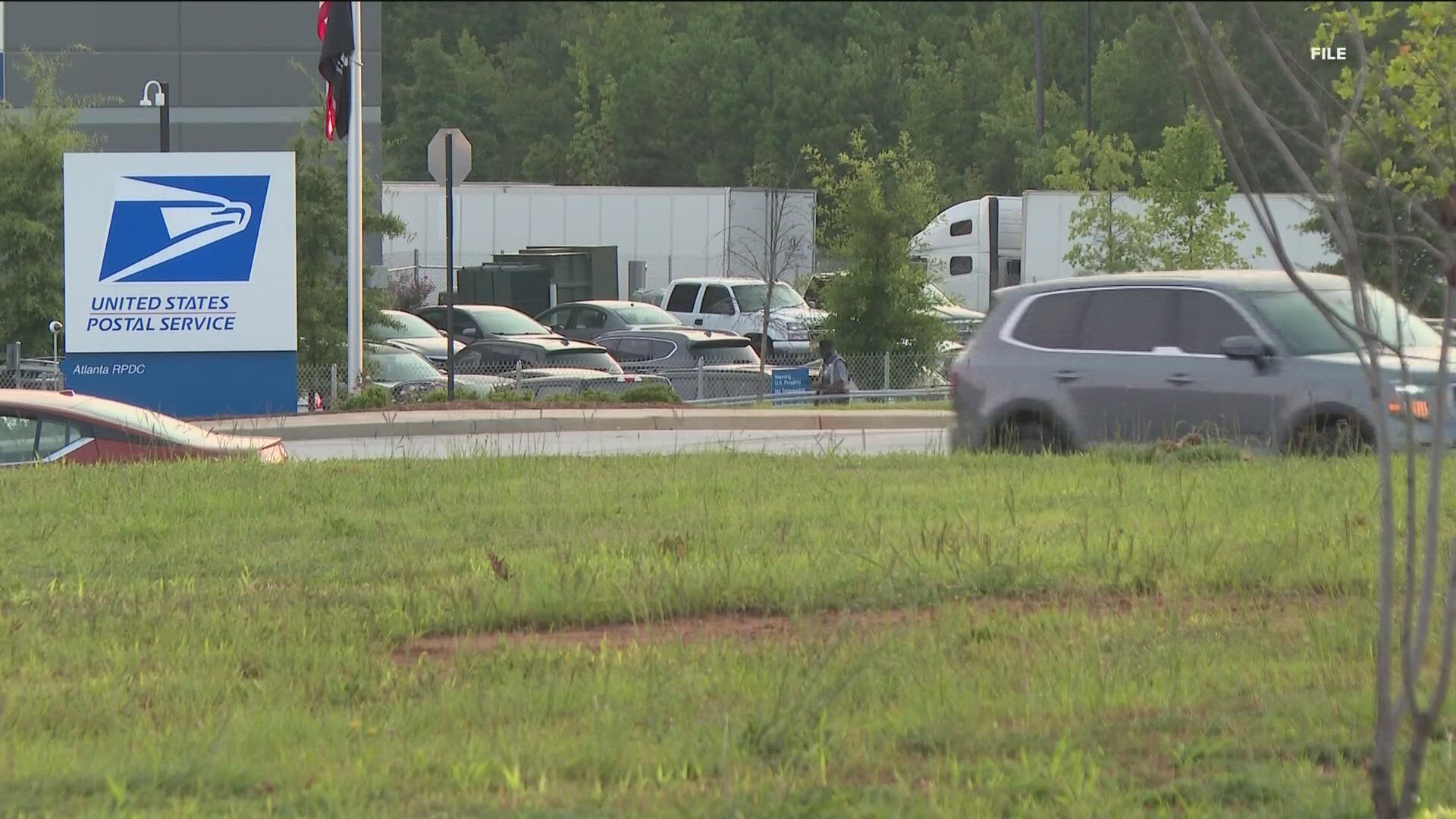PALMETTO, Ga. — A new audit released by the U.S. Postal Service Office of Inspector General gives fresh insight into the delays that followed the opening of a regional postal facility in Palmetto earlier this year, finding that the deployment of a new type of sorting machine was accompanied by "damaged packages" and "overflowing conveyor belts creating safety hazards as mail fell off the machine."
The audit focuses on the deployment of the newly-designed Matrix Regional Sorter, referred to in short as MaRS. The full report, as well as a response by USPS management contained in the audit, is available at this link.
The audit notes that the Postal Service was initially "able to design, contract, build and deploy" the MaRS in less than a year, adding that this is "much faster than prior package sorting machines deployed by the Postal Service."
But the breakdown occurred primarily with maintenance of the machines, which were deployed in Chicago and Atlanta. The audit found USPS "did not adequately plan and prepare for Postal Service maintenance personnel to accept maintenance responsibility from contracts."
"We observed several maintenance issues with the MaRS including belts running on the machine with significant tears and up to 30 belts replaced in a month," a high number, along with "indicators that basic maintenance was not being performed, such as dirt/debris being left on the machine and scanners."
The audit states that the machines were observed in operation on three occasions, in February, April and May of this year. In a response to the audit signed by two Postal Service executives, USPS management contended the timing of the audit -- soon after the deployment of MaRS -- carried expectations of "an issue-free start-up" that were "unrealistic."
That response, signed by USPS Chief Technology Officer and Executive Vice President Scot Bombaugh, and Vice President, Processing and Maintenance Operations Dane Coleman, also said issues raised in the report were "being actively worked at the time of the audit and have been addressed."
In August, 11Alive's Liza Lucas reported on issues with the MaRS causing delayed packages. An employee shared photos with 11Alive showing containers of packages that had been rejected by the sorting machine.
“All sorters are going to have rejects for a number of reasons,” the employee stated. “What's unacceptable in this case in that this many packages are sitting and not being processed.”
USPS confirms the August issue has been resolved, but the new audit also touches on issues with delayed packages stemming from the MaRS. In particular, packages that had to be re-sorted or re-run on the machine sometimes got "stuck in a loop," as the report puts it, with packages recirculating multiple times through the system. There were some pieces of mail in Atlanta that circulated over 100 times across more than 30 days, the audit states.
This was "due in part to belts getting overloaded and mailpieces stacking on top of one another, causing the machine scanners to not be able to read the barcodes."
Other reasons for rescanning were the dirt and debris around machines, which affected the scanners' ability to read barcodes, and some employees loading mail on to the wrong conveyor belts.
"For example, we observed an employee improperly load a container of mail to be delivered to addresses in Atlanta onto the conveyor belt for mail leaving Atlanta," the audit states. "...Employees in the area stated that not everyone was trained to know what conveyor was for mail to Atlanta versus mail from Atlanta."
The audit makes several recommendations related to issues such as the planning and deployment of MaRS, rehandling mail and addressing damaged and delayed mail, which were all agreed with by management.
One such recommendation is to "develop a plan to track mail damaged on the MaRS." The management response said "significant progress has been made to reduce damaged mail, and multiple strategies are being tested and measured." In response to another recommendation to ""develop a strategy for monitoring and addressing congestion on the MARS," management said that "multiple changes were implemented to reduce jams, eliminate conveyor overflow and add additional netting."
According to the audit the MaRS, working as designed, will allow USPS to "increase package processing capacity and efficiency while using less floor space, a critical factor to the success of implementing the Postal Service's network transformation and increasing their share in the growing package market."
That network transformation effort, known as "Delivering for America," included opening the new centralized Atlanta Regional Processing & Distribution Center in February of this year, after which on-time delivery performance declined drasticallyin Georgia. The facility consolidated area processing and distribution centers in Atlanta, Augusta, Macon and Duluth, which are being repurposed as local processing centers.
The most recent Office of Inspector General data, for the third quarter of the fiscal year (which includes the period soonest after the Atlanta RPDC opened) listed Georgia as the worst state -- by a considerable margin -- for on-time service percentage (40.20).
More recent data for August on the USPS service performance dashboard for first-class mail shows month-to-month improvements since earlier in the year, and in the latest data from the week of August 24, the on-time delivery rate was reported at 86.79% for inbound mail. That is still, however, below the 92.50% USPS target. The on-time delivery rates between zip codes in Georgia were also lower, at 80.74%.
The ongoing mail delays have created a substantial political outcry in Georgia, with politicians on both sides of the aisle scrutinizing USPS, as well as fed concerns about mail-in ballots being delivered on-time ahead of the November election.
According to the USPS dashboard, in August the on-time delivery rate for first-class election mail was 89.47%.



